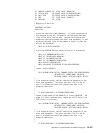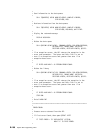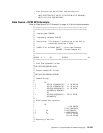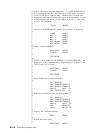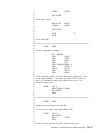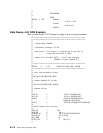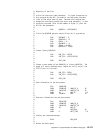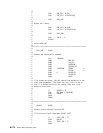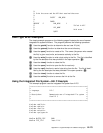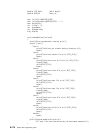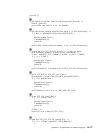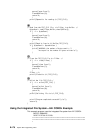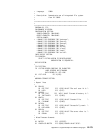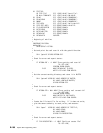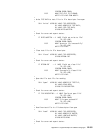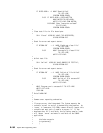
Cᑍ
Cᑍ Print the error and the API that received the error
Cᑍ
C EXCEPT BAD_NEWS
Cᑍ
C ENDSR
OQPRINT E BAD_NEWS 1
O 'Failed in API '
O API_NAME
O 'with error '
O QUSEI
UNIX-Type APIs—Examples
The simple example program on the following pages illustrates the use of several
integrated file system functions. The program performs the following operations:
1 Uses the getuid() function to determine the real user ID (uid).
2 Uses the getcwd() function to determine the current directory.
3 Uses the open() function to create a file. The owner (the person who created
the file) is given read, write, and execute authority to the file.
4 Uses the write() function to write a byte string to the file. The file is identified
by the file descriptor that was provided in the open operation (3).
5 Uses the close() function to close the file.
6 Uses the open() function to open the file for read only.
7 Uses the read() function to read a byte string from the file. The file is identi-
fied by the file descriptor that was provided in the open operation (6).
8 Uses the close() function to close the file.
9 Uses the unlink() function to remove the link to the file.
Using the Integrated File System—ILE C Example
This example program uses the integrated file system from ILE C.
/ᑍᑍᑍᑍᑍᑍᑍᑍᑍᑍᑍᑍᑍᑍᑍᑍᑍᑍᑍᑍᑍᑍᑍᑍᑍᑍᑍᑍᑍᑍᑍᑍᑍᑍᑍᑍᑍᑍᑍᑍᑍᑍᑍᑍᑍᑍᑍᑍᑍᑍᑍᑍᑍᑍᑍᑍᑍᑍᑍᑍᑍᑍᑍᑍᑍᑍᑍᑍ/
/ᑍ ᑍ/
/ᑍ Language: ILE C ᑍ/
/ᑍ ᑍ/
/ᑍ Description: Demonstrate use of integrated file system ᑍ/
/ᑍ from ILE C ᑍ/
/ᑍ ᑍ/
/ᑍᑍᑍᑍᑍᑍᑍᑍᑍᑍᑍᑍᑍᑍᑍᑍᑍᑍᑍᑍᑍᑍᑍᑍᑍᑍᑍᑍᑍᑍᑍᑍᑍᑍᑍᑍᑍᑍᑍᑍᑍᑍᑍᑍᑍᑍᑍᑍᑍᑍᑍᑍᑍᑍᑍᑍᑍᑍᑍᑍᑍᑍᑍᑍᑍᑍᑍᑍ/
#include <stdlib.h>
#include <stdio.h>
#include <fcntl.h>
#include <unistd.h>
#include <sys/types.h>
#define BUFFER_SIZE 248
#define TEST_FILE "test.file"
Appendix B. Original Examples in Additional Languages B-175



